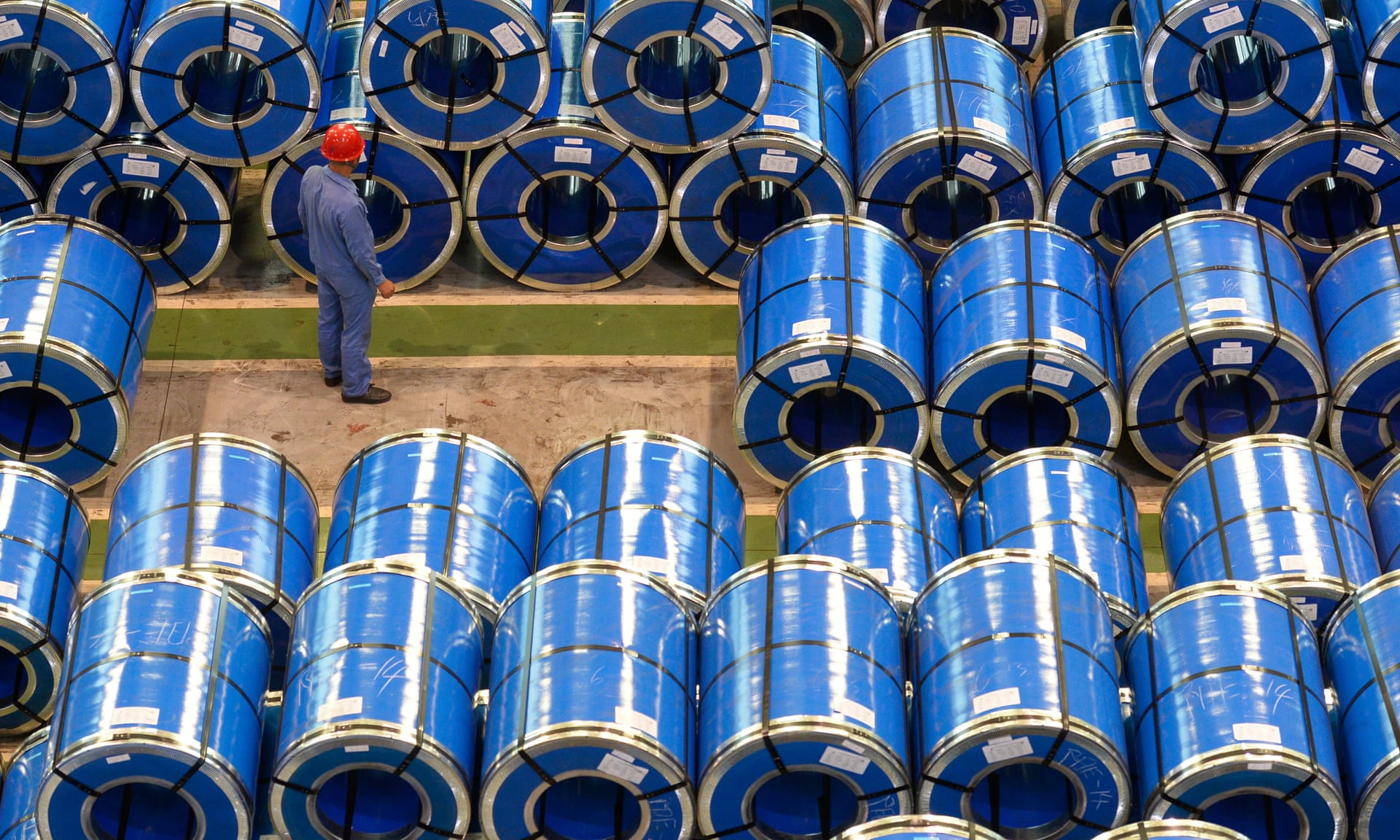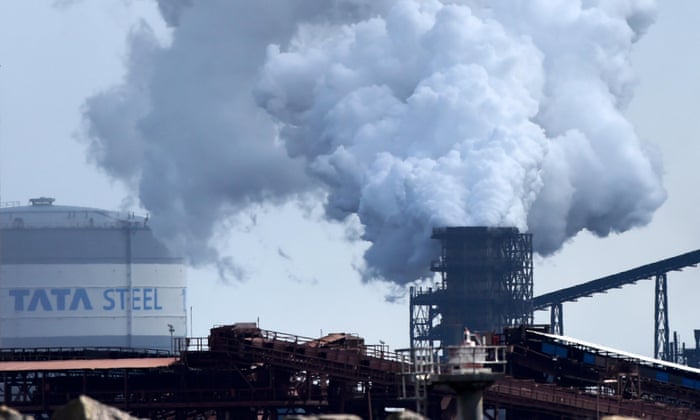By Graham Ruddick

A worker examines rolls of steel at a plant in Taiyuan, China.
The European Union has slapped tariffs of up to 73.7% on Chinese steel after manufacturers were forced to cut jobs due falling prices and demand for the material amid an influx of cheap imports from China.
Thousand of job have already been lost in the steel industry in Britain in the last year with thousands more at risk as the sector remains under pressure.
Industry leaders have blamed the squeeze on the sector on China’s dumping of cheap steel in Europe as it struggles to find buyers for its products domestically.
The EU has agreed to impose import duties of between 13.2% and 22.6% on Chinese hot-rolled steel, which is used in pipelines and gas containers, and 65.1% and 73.7% on heavy plates, which are used in civil engineering projects.
The state of the steel industry became part of the debate about Britain’s future in the EU before the referendum in June, with Brexiters claiming that the country would be better able to protect workers and introduce tariffs on Chinese imports if it voted to leave.
UK Steel, the industry trade body, welcomed the speed at which the new EU tariffs had been introduced but warned that the levy on hot-rolled steel was not high enough, which could hurt Port Talbot, the biggest steelworks in Britain.
Dominic King, head of policy and external affairs at UK Steel, said: “The speed at which tariffs have been imposed on dumped steel from China by the EU is very welcome. However, while we hope the tariffs for heavy plate are robust enough to ensure free and fair trade, the proposed levels for hot-rolled steel are not high enough, which might encourage China to continue dumping it on to the EU market.”
David Martin, Labour MEP for Scotland, said the tariffs may be “too little too late” for the UK industry.
Martin, the international trade spokesman for the Socialist and Democrats group in the European parliament, said: “The [European] commission has recognised that Chinese dumping is having a real, damaging effect on EU steel producers and the communities supported by them.
“However, whilst the tariffs on heavy-plate steel are at a workable level, the duties on hot-rolled steel – a crucial product of Tata Steel’s Port Talbot plant – won’t deter Chinese steelmakers from further dumping. I sincerely hope these duties will be revised upwards at a later date.
“What is pleasing is that this procedure was concluded five weeks ahead of schedule – finally the commission is waking up to the urgency of this situation. Whether it is too little, too late for UK steel, only time will tell.”
The EU has agreed to impose import duties of between 13.2% and 22.6% on Chinese hot-rolled steel, which is used in pipelines and gas containers, and 65.1% and 73.7% on heavy plates, which are used in civil engineering projects.
The state of the steel industry became part of the debate about Britain’s future in the EU before the referendum in June, with Brexiters claiming that the country would be better able to protect workers and introduce tariffs on Chinese imports if it voted to leave.
UK Steel, the industry trade body, welcomed the speed at which the new EU tariffs had been introduced but warned that the levy on hot-rolled steel was not high enough, which could hurt Port Talbot, the biggest steelworks in Britain.
Dominic King, head of policy and external affairs at UK Steel, said: “The speed at which tariffs have been imposed on dumped steel from China by the EU is very welcome. However, while we hope the tariffs for heavy plate are robust enough to ensure free and fair trade, the proposed levels for hot-rolled steel are not high enough, which might encourage China to continue dumping it on to the EU market.”
David Martin, Labour MEP for Scotland, said the tariffs may be “too little too late” for the UK industry.
Martin, the international trade spokesman for the Socialist and Democrats group in the European parliament, said: “The [European] commission has recognised that Chinese dumping is having a real, damaging effect on EU steel producers and the communities supported by them.
“However, whilst the tariffs on heavy-plate steel are at a workable level, the duties on hot-rolled steel – a crucial product of Tata Steel’s Port Talbot plant – won’t deter Chinese steelmakers from further dumping. I sincerely hope these duties will be revised upwards at a later date.
“What is pleasing is that this procedure was concluded five weeks ahead of schedule – finally the commission is waking up to the urgency of this situation. Whether it is too little, too late for UK steel, only time will tell.”

The Tata steelworks in Port Talbot.
The future of Port Talbot and Tata Steel’s 11,000 UK staff remains unclear as the Indian company considers a merger with German group ThyssenKrupp and tries to negotiate a rescue package with the UK government.
Trade union leaders hit out at Tata Steel on Friday over its failure to sell off its speciality steels business in Yorkshire and County Durham.
Tata Steel put the business up for sale in the summer as it desperately tried to stem the losses in its UK business.
The speciality steels arm employs more than 2,000 people in Sheffield, Rotherham and Hartlepool. Roy Rickhuss, general secretary of steelworkers union Community, said the business was of “huge importance” to the area.
He added: “When Tata announced that they wanted to sell the business, we called on them to act as a responsible seller. The continued lack of information about that process and the worry this has caused amongst their loyal workforce is highly irresponsible.
“Speciality steels has every chance of a bright, profitable future, but this will only be possible if Tata ensure a new owner is able to invest in the business and build a positive relationship with the workforce.
“The months of uncertainty and delays must end today. Tata must come clean about the state of the sales process and fully involve the trade unions in helping to build a new future for this vital industry and its highly skilled workers.”
The speciality steels arm employs more than 2,000 people in Sheffield, Rotherham and Hartlepool. Roy Rickhuss, general secretary of steelworkers union Community, said the business was of “huge importance” to the area.
He added: “When Tata announced that they wanted to sell the business, we called on them to act as a responsible seller. The continued lack of information about that process and the worry this has caused amongst their loyal workforce is highly irresponsible.
“Speciality steels has every chance of a bright, profitable future, but this will only be possible if Tata ensure a new owner is able to invest in the business and build a positive relationship with the workforce.
“The months of uncertainty and delays must end today. Tata must come clean about the state of the sales process and fully involve the trade unions in helping to build a new future for this vital industry and its highly skilled workers.”
Aucun commentaire:
Enregistrer un commentaire